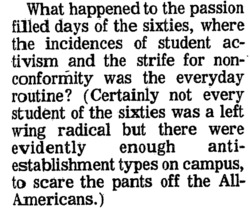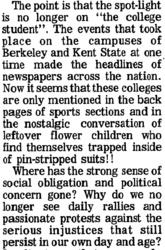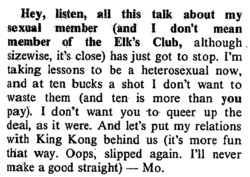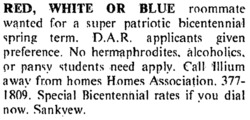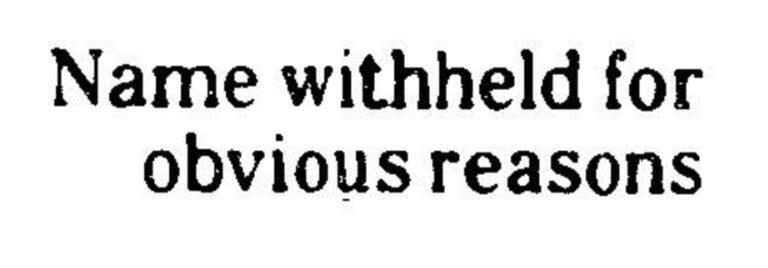"Name Withheld for Obvious Reasons"
The Gay Liberation Front of Albany posted no further advertisements beyond the aforementioned three in the Concordiensis. Their level of activity and community involvement only grew from that point on, so why any semblance of connection between their organization and Union College on a public-facing front was severed cannot be easily or succinctly answered, but it may have something to do with broader historical trends that took place in the United States during the 1970s that certainly reverberated and were felt at Union College.
Disillusionment took over the campus community in a general sense in the 1970s; the Union Press dissolved due to a perceived lack of interest in their goals by the rest of the campus community, frequent student protesting came to a halt. A 1981 piece from the Concordiensis sees a student wonder why her peers have become so unengaged in politics and questions of social justice in the preceding few years when there was so much political activism at the forefront of the public consciousness barely even a decade previously. This was a reflection of an era of political disillusionment of the nation on a wide scale. During the 1970s, then, Union College’s connection with Albany’s Gay Liberation Front either faded into an underground capacity untraceable by official campus records, as social justice issues in general slid backwards from the forefront space they’d occupied at the turn of the decade, or the connection faded away entirely.
Transcription: What happened to the passion filled days of the sixties, where the incidences of student activism and the strife for non-conformity was the everyday routine? (Certainly not every student of the sixties was a left wing radical but there were evidently enough anti-establishment types of campus, to scare the pants off the All-Americans.)
Transcription: The point is that the spot-light is no longer on "the college student." The events that took place on the campuses of Berkeley and Kent State at one time made the headlines of newspapers across the nation. Now it seems that these colleges are only mentioned in the back pages of sports sections and in the nostalgic conversation of leftover flower children who find themselves trapped inside of pinn-stripped suits!! Where has the strong sense of social obligation and political concern gone? Why do we no longer see daily rallies and passionate protests against the serious injustices that still persist in our own day and age?
Public activism may have faded, but discussions of queerness did not disappear entirely from the Concordiensis during the 1970s, though these discussions were often in explicitly homophobic and transphobic contexts, or they were presented in such satirical or joking manners that it is difficult to glean the sincerity of the author, such as in a 1976 personal by “Mo.”
A letter, aptly titled “Commentary: Homosexuality,” was published in the Concordiensis on October 25, 1979 by an author who called themself “Name withheld for obvious reasons.” The letter affirms the fact that discussions of queerness in official campus literature may have been largely absent in the period of the 70s, but these matters did not disappear from people’s minds.
The author lamented the fact that media coverage and public perception of LGBTQ+ individuals is overwhelmingly negative, stating that they were inspired to write a piece of their own after reading a piece discussing the film Cruising in New York Magazine.
They argue that limiting, narrow stereotypes, which categorize all LGBTQ+ people as fitting neatly into butch subculture, leatherman subculture, sadomasochistic subculture, or effeminate subculture, are to blame, writing, “it is my belief that much of the negative attitude towards homosexuals is due to the fact that people do not understand what it is to be a homosexual.” They argue that “the straight world is just as full of kinky eccentrics,” yet no straight person is judged nearly as harshly for their preferences. The author goes onto admit their own prior misguided assumption that queer people fit easily into well-established boxes: “it actually came as a surprise to me when I learned that a large percentage of gays do not fit into these established categories. They’re people…” This sentence gives the impression that the author is an outsider to the queer community, looking in, earnestly seeking to learn more.
The author then implores that members of the Union community who are LGBTQ+ should organize, not necessarily to engage in activist work or to come out to the entirety of the campus, but simply in order to support each other. They write:
“being gay is difficult in a world full of prejudice and discrimination. I hope that the members of the college gay community will put forth their efforts to start regular meetings, not for the purpose of declaring their sexuality to the entire college community, but in order to help each other deal with some very common problems that exist for gays in modern society.”
This section of the letter implies more so that the author is a stakeholder in a potential LGBTQ+ organization or group on campus, though they do not say so outwardly.
The author concludes their thoughts by recognizing that they have vacillated over whether or not they actually wanted to publish the letter, cognizant of the fact that it would receive a mixed reception, but they came to the conclusion that “keeping the topic in the closet, or as a topic merely for jokes, will not help people in their understanding of homosexuality, and of each other. It is my belief that many of us, including myself, can improve our understanding of sexuality in general, and not just of homosexuality.”


